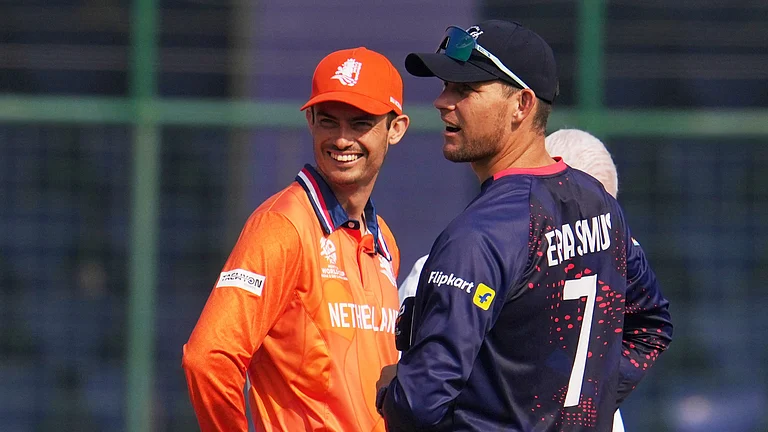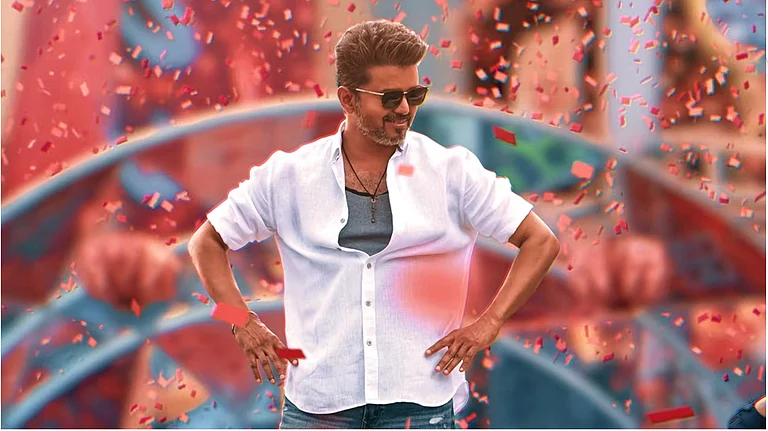Can the Muslims form a political party of their own? A most interesting trend of this round of assembly polls has been the emergence of the Assam United Democratic Front(AUDF) in the state. For a new entrant, it has emerged as big as the BJP, tying up in third place. And since theAUDF is linked to several all-India Muslim organisations, its performance cannot be ignored. It will undoubtedly trigger a debate in the community over whether Muslims should form similar fronts in other states too. The flip side of the argument: is this is a healthy trend for the Indian polity? That the community’s vote matters is evident, the Congress has already expressed concern that they may have lost a chunk of it to the embrace between Prime Minister Manmohan Singh and the US’ George Bush.
The AUDF was floated barely six months ago by Badruddin Ajmal, a millionaire businessman from Hojai in central Assam who runs a successful perfumery business in Mumbai. Ajmal told Outlook that he sees theAUDF as a pressure group working for the interests of minorities. "Everyone chases the Muslim vote, but no one does anything for the community. Why shouldn’t the community keep the vote and act for itself?" he asks, adding, "See how successful theBSP has been in promoting Dalit interests. Muslims must replicate this model...we will spread to other parts of the country."
Ajmal’s claims are significant. He happens to be the Assam president of the Jamaat Ulema-e-Hind, arguably the Muslim organisation with the greatest mobilising capacity in the country. Some months ago, the Jamaat put on a massive show of strength in New Delhi with lakhs turning out to protest against US president Bush’s visit to India. The organisation has also been known to mobilise thousands in West Bengal, Mumbai, Uttar Pradesh, even Gujarat. Till now, the Jamaat has been a socio-religious outfit. Is the Assam experiment a sign that the influential Jamaat will directly enter politics?
Maulana Mahmood Madani, general secretary of the Jamaat and an RS member, is guarded in his response. "Our main purpose in Assam was to show that we are there, we cannot be ignored. Our strength as an organisation has always been known, but we have kept out of direct politics. I believe an Assam-type experiment can be tried out elsewhere, but only as part of a front. We’ll never support the idea of a Muslim party."
The Maulana is all too aware of the pitfalls of such a move. The historical antecedents of the Partition would inevitably cast their shadow on any such enterprise. "Any party based on religion alone would eventually harm the community," he says. Although theAUDF’s emergence is further proof of the splintering of the Indian polity, a Muslim party cannot be viewed from the same lens as a Dalit orOBC party.
But with the Jamaat having sizeable influence in parts of western UP, the Maulana admits that pressure to enter politics would increase in the run-up to the state elections in 2007. "We’ll have to act carefully...if overnight we become a political party, some of the so-called secular parties of UP will play communal politics," he says. Madani himself was backed by Ajit Singh’sRLD when he recently won the RS election from UP.
The situation though is not the same the country over. In Kerala, the Indian Union Muslim League, an ally of the Congress-ledUDF, suffered huge reverses in their traditional stronghold of Malappuram. Here the Left cleverly managed to make foreign policy issues like the Iran vote and the Bush visit into big electoral issues for the community. The Left catchline in Muslim pockets was that theCongress-IUML was "breaking bread with imperialists and fascists who were waging war on Islam". TheLDF also had the backing of the National Democratic Front, an ultra-religious Muslim outfit. It also didn’t go down well with the community that someIUML heavyweights were mired in sex scandals and such else.
So, in Kerala an established Muslim party, the IUML, suffers losses, while in Assam a new front makes an impressive debut. The common thread uniting the two corners of the country is the presence of big Muslim populations. For the future, UP too has such pockets, but the community will have to tread lightly. Or else they will only invite a backlash.
***
Postscript: (added by outlookindia.com):
Much after we went to press, on Monday, May 15, the Assam verdict had itsimpact in Uttar Pradesh. Noted Shia scholar Maulana Kalbe Jawwad, announced theformation of Peoples' Democratic Front (PDF) that would contestassembly polls next year.
The front has announced Maulana Kalbe Jawwad as its president and Shahi Imam of the Delhi JamaMasjid, Syed Ahmed Bukhari, as itspatron. The Shahi Imam could not be in Lucknow, as he missed his flight, toannounce the formation of the new front. The Maulana said the decision to form a separate political outfit was arrivedat a meeting of various smaller Muslim outfits like Muslim Majlis, All IndiaMuslim Forum, Parcham Party of India, Indian League and Momin Conference.
According to Maulana Kalbe Jawwad, the Muslim political parties "havederived vigour and inspiration from the recently held assembly elections inAssam where a similar Muslim outfit has won significant number of seats on thebasis of its own strength".
PDF has been launched, he said, with a view toenabling the Muslims to share power on the basis of their distinct electoralstrength. It would be fielding its candidates in the next assembly elections inthe state as "there are 147 constituencies in UP where Muslims can ensurevictory of their candidates".
Saba Naqvi Bhaumik with John Mary and outlookindia.com
























